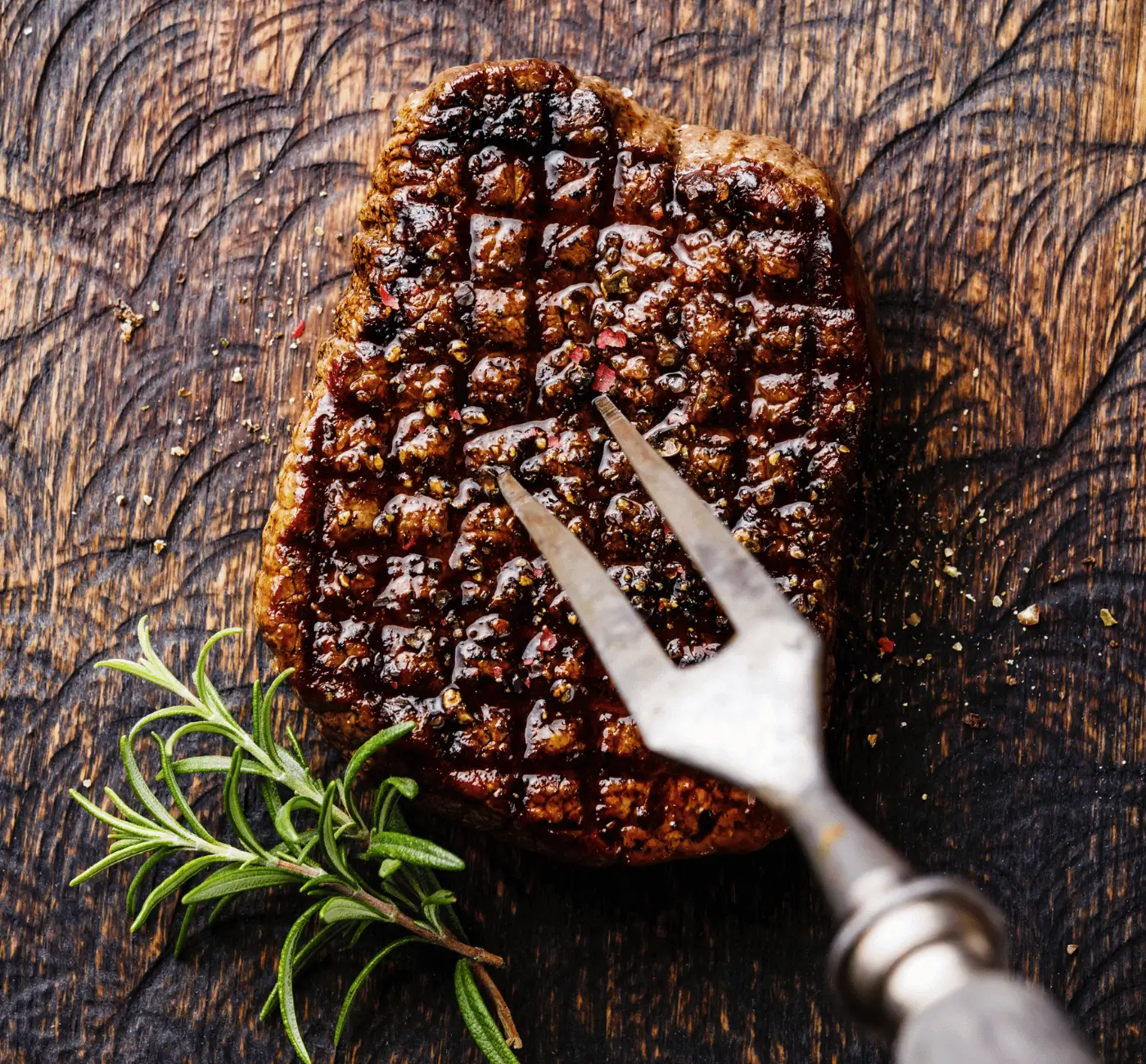
If there’s one food documentary out there that deserves a major science-backed debunking, It’s the plant-based anthem, Forks Over Knives (2011).
Since its release, Forks Over Knives has held a revered place in the hearts of anti-meat-eaters everywhere. And it’s probably responsible for minting more than a few of them.
The film centers on the views of plant-based diet doctors T. Colin Campbell, Caldwell Esselstyn, and John McDougal. Their collective position can be summed up as follows:
Most major health issues, including heart disease, cancer, and diabetes, can be prevented and even reversed by following a meat-free diet of vegetables and whole grains.
But the truth is this feel-good anti-meat ra ra is based on remarkably bunk science espoused by blinkered old doctors whose downright mind-boggling perspectives are best put out to pasture.
In this article, we’ll debunk the core ideology of Forks Over Knives by taking a scientific look at the studies these doctors cited and, in some cases, even produced themselves.

From beginning to end, Forks Over Knives deserves a debunking. In act 1, dietary cholesterol is given the boogyman treatment, and the animal foods that contain it are shunned:
13:06—...when we consume dietary cholesterol, which is only found in animal foods like meat, eggs, and dairy products, it tends to stay in the bloodstream. This so-called plaque is what collects on the inside of our blood vessels and is the major cause of coronary artery disease.
This view that dietary cholesterol significantly contributes to blood cholesterol and raises the risk of heart disease is, in short, bogus.
Modern science tells us that dietary cholesterol has little to no effect on blood cholesterol levels in most people.1
Furthermore, numerous high-quality studies routinely show that dietary cholesterol has no association with an increased risk of heart disease (20 21)
A lot of modern, high-quality research on cholesterol has been centered around eggs since they’re among the highest cholesterol foods. And guess what, study after study shows that eating eggs is not associated with an elevated risk of heart disease (22 23 24 25 26)
It’s remarkable to watch the Forks Over Knives doctors willfully ignore the fact that 70 percent of your cholesterol is produced by your own liver. The rest you get from food. When your dietary cholesterol goes up, your body does a good job adjusting.
So where did this dietary cholesterol = heart disease stuff come from?
A review from 2009 explains that a major flaw had to do with basing early cholesterol research on feeding studies with rabbits who are obligate herbivores. Rabbits process dietary cholesterol in a completely different way than humans who are facultative carnivores. 4
The doctors in “Forks Over Knives,” it seems, are among the few stragglers who still believe dietary cholesterol is harmful.
That’s not to say dietary cholesterol has zero effect.
Around 70% of the population are cholesterol “hypo-responders”. This means the cholesterol from food has a negligible effect on total blood cholesterol. 4
The other 30% of people are “hyper-responders.” This means they do see an increase in blood cholesterol from eating cholesterol-rich foods. But this is accounted for by a proportional increase in both (bad) LDL and (good) HDL, which does not increase the risk of heart disease. 5
One recent study found that for both hypo and hyper responders, there was no change in LDL/HDL ratios even when fed an extra 640 mg (240% more than the RDA) of cholesterol. 6
Additionally, some high cholesterol foods like eggs have been shown to make LDL less risky by increasing its particle size.5 This is often what happens to cholesterol on high-fat keto, and high-animal food carnivore diets.
Another study on a diabetic population found that a high-cholesterol, high-protein diet improved HDL more than a high-protein low-cholesterol diet. 4
The idea that cholesterol-rich animal foods cause heart disease doesn’t have a leg to stand on. Yet Forks Over Knives leads with it. And it’s only the first of numerous head-scratchers.
The film’s “eat plants not animals” message hinges on another erroneous and seemingly willful misreading of the science.
Campbell takes the view that animal proteins feed cancer cells and, therefore, should be eliminated from our diets. His view is based on a 1968 paper from India called The Effect of Dietary Protein on Carcinogenesis of Aflatoxin. 6
In the study, researchers found that:
Campbell’s take is that you can turn cancer on and off with animal protein. Seems straightforward, right? Wrong!
The details left out by Campbell include:
Aflatoxins are toxic molds that often contaminate plant foods in humid environments–like India.
The cancers in the rats were only initiated and then turned on and off by protein because of extremely unrealistic doses of plant toxins.
For a human to be inflicted with the same concentration of aflatoxins as those poor rats, we’d have to consume over 280,000 contaminated peanut butter sandwiches a day for four days straight!
Campbell and colleagues also omit closely related findings from connected studies:
So if you were using these rat studies to make a choice between a low-protein plant-based diet vs. a high animal protein diet–which would you choose?
The high aflatoxin plant-based low-protein diet in which your liver gets destroyed, and you die in your youth? Or the high aflatoxin diet with casein protein in which you get liver cancer but live for much longer?
If your answer is neither, we’re right there with you.
There is absolutely nothing about these studies that make them relevant to human bodies and diets. The cancer is artificially stimulated by unreal quantities of toxins that have nothing to do with animal proteins. Also, we’re talking about rats, not people.
Yet Campbell points to these scientifically ancient studies as the “Aha” moment that shaped his views on diet.
At this point, you’re probably wondering what actually happens when protein is restricted or permitted in bodies subjected to more realistic doses of aflatoxin.
Though we don’t have a human control study, we do have one on rhesus monkeys, who are much more similar to us than rats. No surprise that Campbell left this one out too.

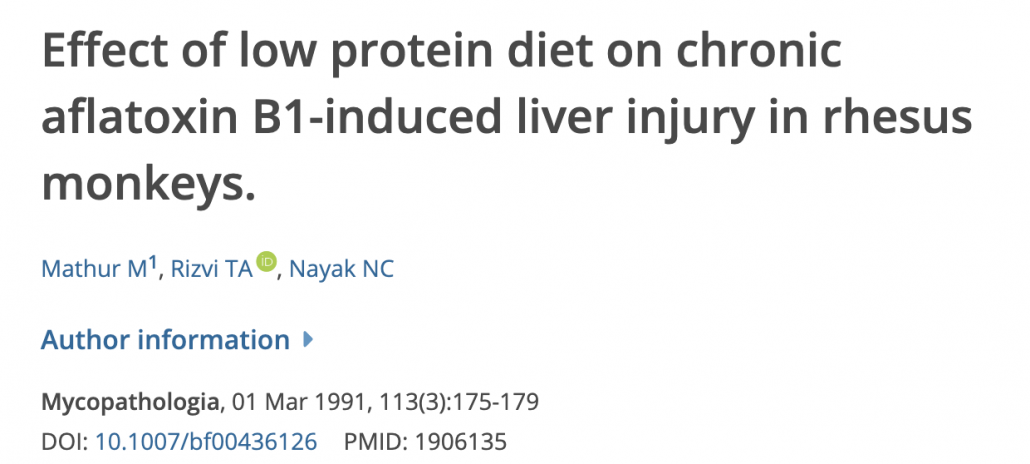
In this study, as with the rats, the Monkeys ate either 5% or 20% casein. This is what happened 4:
In other words, with real-world concentrations of aflatoxin a high-casein (protein) diet was protective against both non-cancerous and cancerous damage to the liver. These protective properties of protein persisted even when the aflatoxin was boosted.
Better science and more honest reading of the data tells us that Campbell’s hypothesis, or whatever you call it, is actually the opposite of what’s true.
If you’re shaking your head in disbelief at how this guy’s views became the centerpiece of a theatrically released documentary, we’re right there with you.
Not only do the Forks Over Knives doctors extrapolate findings from an extreme experiment on hyper-toxic rats into recommendations for human nutrition. They conflate casein–which is only one type of animal protein–with all animal protein.
As we showed above, casein is only carcinogenic in the context of extremely high aflatoxin concentrations.
Furthermore, it is only one of the proteins in dairy products that it was isolated from. The other significant protein in dairy is whey, which has been shown to be strongly anti-carcinogenic. 3
There is no evidence actually linking A1 casein (the kind found in cows’ milk) with cancer in humans.

Furthermore, there is strong evidence that consuming dairy reduces the risk of colorectal cancer, likely mediated by calcium and vitamin D. 4
At Minute 26:29 the film narrator says, “Even more surprising, Dr. Campbell found that a diet of 20% plant proteins from soybeans and wheat did not promote cancer.”
Though it’s true that plant proteins didn’t turn on cancer of in the livers of hyper-toxic rats at 20%, it did turn on cancer growth in the same way as casein when combined with lysine. Lysine is an essential amino acid that wheat is low in. In other words, complete amino acids from either plants or animals will promote cancer in toxic rats.5
Interestingly these findings are from experiments done by T. Colin Campbell himself! So the fact this info is omitted is intentionally misleading.
Minute 19:21—Dr. Esselstyn also discovered that in the 1970s, the risk for heart disease in rural China was 12 times lower than it was in the US. And in the highlands of Papua New Guinea, heart disease was rarely encountered. The link he noticed between all the areas he studied was simple. [Esselstyn:] “Virtually the Western diet was nonexistent. They had no animal products. No dairy, they had no meat.”
There are a few major problems with Dr. Esselstyn’s cherry-picked remarks.
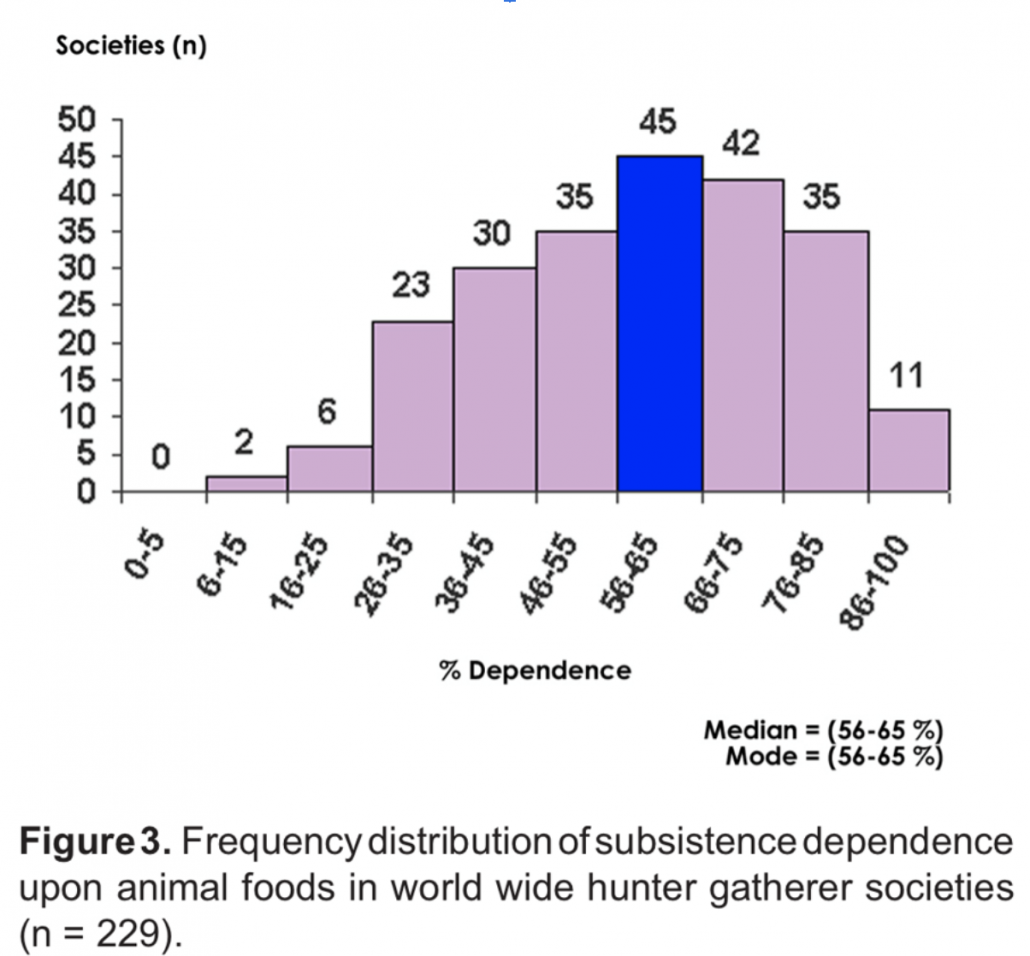
To drive home the point that animal fats and foods are not the cause of heart disease, let’s bring in this 2020 study co-authored by researchers from leading medical schools around the world, published in the Journal of the American College of Cardiology.
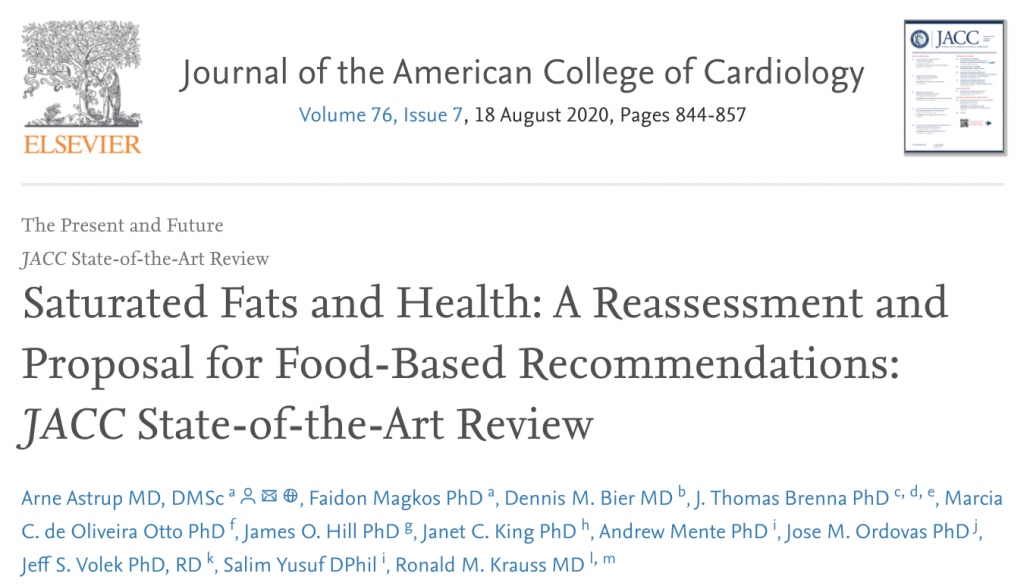
The authors conclude:
“Whole-fat dairy, unprocessed meat, and dark chocolate are SFA-rich foods with a complex matrix (of nutrients) that are not associated with an increased risk of CVD. The totality of available evidence does not support further limiting the intake of such foods.”
Dr. Kiltz’s Take
Vilifying meat as the cause of heart disease is simply wrong. Doing so ignores the science that tells us meat is, in fact healthy while distracting us from the real root of disease. Ultra-processed plant-based foods loaded with toxic vegetable oils and sugar.
One of the most complex areas where Forks Over Knives needs debunking is its presentation of wartime diet and heart health in Norway.
Minute 19:50—In World War II, the Germans occupied Norway. Among the first things they did was confiscate all the livestock and farm animals to provide supplies for their own troops. So the Norwegians were forced to eat mainly plant-based foods…With the cessation of hostilities in 1945, back comes the meat, back comes the dairy, and back comes the strokes and heart attacks.
The film flashes this handy swastika-emblazoned graphic:
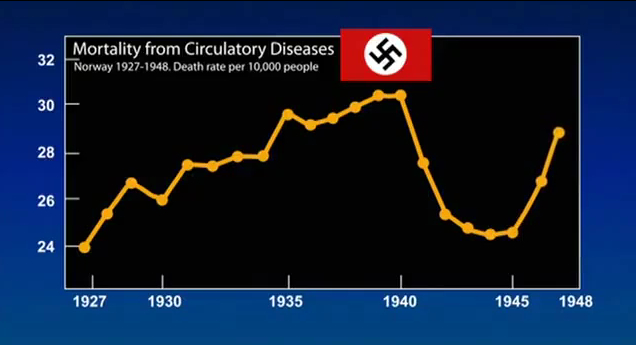
Here again, Dr. Esselstyn extends his misreading of the evidence to support his misinterpretation that meat causes heart disease and his total fantasy that a vegan diet makes it go away.
But as we’ll see, there was much more going on in the wartime diets of our long-suffering Norwegians than a meat/veggie toggle switch.
But even before we get into what was actually happening with regard to the Norwegian diet, let’s note that the “big” dip in deaths from heart disease was only a decrease of 30-24 deaths 6 per 10,000 people. Though not entirely insignificant, the film overstates the dent made by the wartime diet.
When looking at papers that actually tracked the actual changes to the Norwegian wartime diet, we find that 3:
Ok, that’s a heck of a lot of information making for a much more complex story of wartime Norwegian nutrition than Dr. Esselstyn’s no meat + more veggies= less heart attacks.
Let’s distill these findings even further. The Norwegian wartime diet was:
In short, there was nothing “plant-based” about this diet.
Ok, here’s the kicker–all of the above could be completely moot. The moderate decrease in heart disease could have simply resulted from people dying more rapidly from the increase in infectious diseases like penumonia–which doubled during WWII.
All of this is to say there’s simply no real evidence, and lots of contradictory evidence, that a reduction in “meat” led to reduced death by heart disease in Norway during WWII.
Minute 21:56—[McDougall:] Their kids, they started to give up the rice and replace it with animal foods, the dairy products, the meats… and the results were obvious. They got fat and sick. I knew, at that point, what causes most diseases.
Wow, somebody didn’t read the graphs!
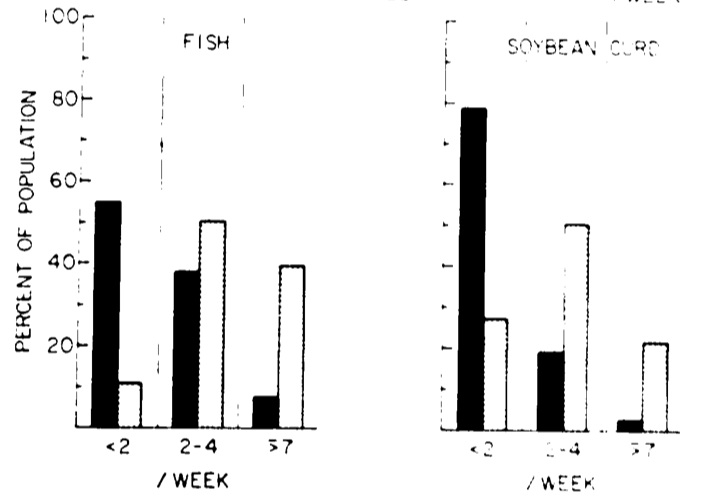

What do the actual studies comparing the change in Japanese and Japanese-American diets tell us?
In short, contrary to Dr. McDougall’s naive observations, Japanese America’s got fat by eating more wheat, adding margarine and other seed oils to their diets (though we don’t know how much) while abandoning rice and fish.
Minute 29:00—Over the next several years, Campbell initiated more extensive lab studies using various animal and plant nutrients. The results were consistent. Nutrients from animal foods promoted cancer growth, while nutrients from plant foods decreased cancer growth.
This is a straight-up lie.
In two 1985 studies, Campbell found fish oil to inhibit cancer and corn oil to promote cancer.5 6
Improvements in health outcomes from completely eliminating oils were do to cutting out omega-6 fatty acids and polyunsaturated fatty acids from, guess where—plant foods!
Though Dr. Esselstyn got this improvement by eliminating all fats, it would be healthier to cut out processed vegetable oils and leave in harmless and healthy saturated animal fats.
Don’t believe us that saturated fats are healthy–please read this
And if you have any doubts as to how unhealthy vegetable oil is despite what the government tells us, please read this.
Finally, let’s turn to randomized control trials pitting a high-meat low-carb, high-fat, high-protein die against Ornish’s extremely low-fat vegetarian diet, and a ZONE diet with 40/30/30 carb, fat, and protein ratios.4
Of the 311 participants, all had a hard time sticking to their diets. All lost about the same amount of weight. Yet the high meat, fat, and protein dieters saw significantly greater improvements in HDL cholesterol and blood pressure.
Minute 49:30—[Chen:] “I think the major message we got out of this correlation analysis is only one message: The plant-food based diet—mainly cereal grains, vegetables, and fruits, and very little animal food—is always associated with lower mortality of certain cancers, stroke, and coronary heart disease.”
Dr. Chen is referring to a major population study called “Diet, Life-style, and Mortality in China”.
First of all, as a population, or epidemiological study, it can only provide correlations. It would be unethical and un-scientific to extrapolate notions of causation. At best it’s a signpost for future controlled trials that can help us have better ideas of causality, or lack thereof.
In nutritionist Denis Minger’s China Study critique, she pulled numerous correlations directly from the study that contradict the Fork’s Over Knives doctors’ conclusions. The way this works is that a positive number closer to one means a greater correlation, or is more often associated with an outcome. While a negative number closer to -1 has a negative, or inverse correlation, meaning it’s less likely associated with an outcome.
For example:
There are some cancer clusters among meat eaters. However, they are in coastal i.e. industrialized areas, where they also consume more sugar, starch, vegetable oil, and beer, smoke more cigarettes, and work inside sitting down rather than laboring outdoors.
Even when acknowledging that urbanized lifestyles are deadly, a paper that Campbell himself co-authored states that a paper Campbell himself co-authored: “it is the largely vegetarian, inland communities who have the greatest all-risk mortalities and morbidities and who have the lowest LDL cholesterols.” 6
The Forks Over Knives documentary tells a simple yet flatly misleading story that animal foods are the cause of the modern epidemics of heart disease and cancer. The answer, according to the plant-based doctors who appear in the film, is simply to eliminate meat while boosting whole grains and veggies.
This take on the connection between diet and health is essentially backward. It ignores reams of contradictory data, cherry-picks from flawed studies that are not adaptable to human beings and is addled with willful ignorance at every turn.
New research into the benefits of eating meat and animal products, along with modern examinations of human dietary evolution tell a very different story.
In which meat, especially fatty meats and organs, played the central role in human diets for 2 million years, up until the agricultural revolution only around eight thousand years ago.4
Based on the available evidence, the key to metabolic health is likely a re-centralization of meat in the human diet and the elimination of processed foods along with grains, sugars, and plant foods that contain plant toxins and antinutrients.

.png)
.png)
We’re a global community of seekers, healers, and doers committed to reclaiming health on our own terms. When you join the Kiltz Mighty Tribe (KMT), you’ll gain access to education, support, and collective wisdom.

